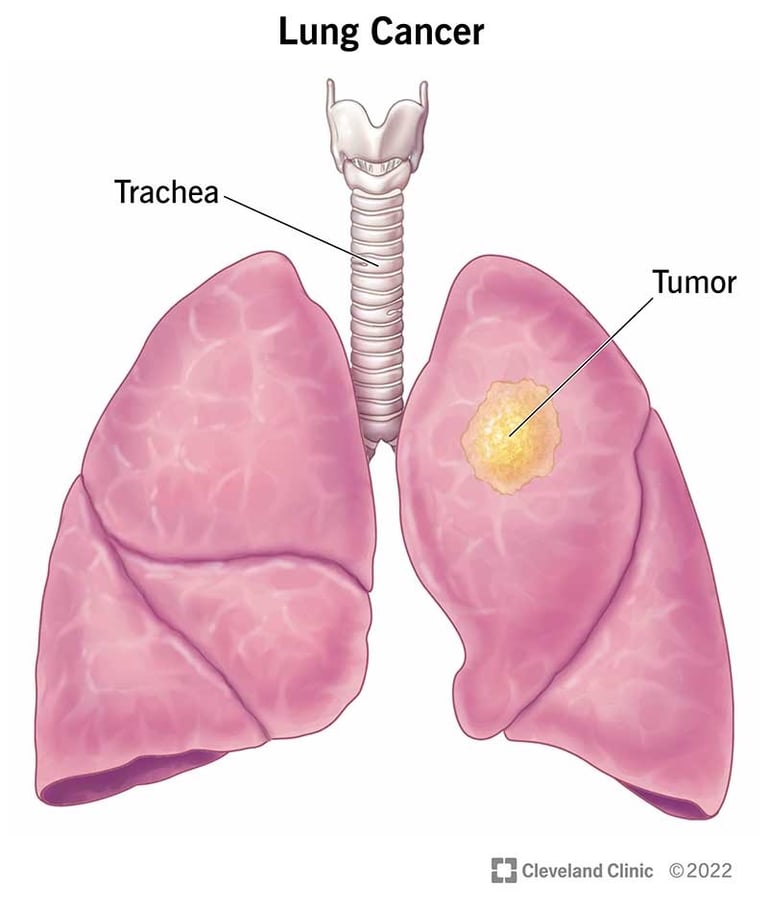Lung Cancer
Overview
Lung cancer is one of the most common and serious cancers worldwide. It develops when abnormal cells grow uncontrollably in one or both lungs, forming tumors that interfere with normal lung function. In India, lung cancer cases are steadily rising, largely due to lifestyle and environmental factors — but early detection and advanced treatment are significantly improving patient outcomes.
Causes and Risk Factors
The major causes of lung cancer include:
Tobacco smoking: The single most important risk factor; even passive smoking increases risk.
Environmental pollution: Long-term exposure to air pollutants and particulate matter.
Occupational exposure: Asbestos, arsenic, chromium, and other industrial carcinogens.
Radon gas: A naturally occurring radioactive gas that can accumulate indoors.
Genetic susceptibility: Family history of lung cancer can increase individual risk.
Non-smokers: A growing proportion of lung cancers occur in non-smokers, often linked to
genetic mutations or air pollution.
Common Symptoms
Lung cancer may remain silent in early stages, but common symptoms include:
Persistent cough that doesn’t go away.
Coughing up blood (hemoptysis).
Shortness of breath or wheezing.
Chest pain or discomfort.
Unexplained weight loss and fatigue.
Recurrent chest infections or pneumonia.
Early recognition of these symptoms and timely medical evaluation are key to improving survival rates.
Treatment Approaches
Lung cancer treatment depends on the type (non-small cell or small cell) and stage of disease. The main modalities include:
Surgery: Removal of the affected portion of the lung (lobectomy or pneumonectomy) when feasible.
Radiation Therapy: Precisely targets and destroys cancer cells while sparing healthy lung tissue.
Chemotherapy: Used alone or with radiation to destroy microscopic disease.
Targeted Therapy: Drugs that attack specific mutations such as EGFR, ALK, or ROS1.
Immunotherapy: Stimulates the patient’s immune system to recognize and kill cancer cells.
Cutting-Edge Cancer Care by Dr. Rajesh Natte
Dr. Rajesh Natte, an expert in radiation oncology, is revolutionizing lung cancer treatment with precision-guided radiotherapy. By integrating Image-Guided Radiotherapy (IGRT), Intensity-Modulated Radiotherapy (IMRT), and Stereotactic Body Radiotherapy (SBRT), he delivers highly focused radiation to lung tumors with millimeter accuracy — maximizing cancer control while minimizing side effects to surrounding organs like the heart and healthy lung.
Through the use of 4D-CT imaging, respiratory motion management, and AI-assisted adaptive planning, Dr. Natte ensures that even tumors that move with breathing are treated effectively. These advanced technologies have significantly improved cure rates, reduced treatment time, and enhanced patients’ quality of life.
Summary
Lung cancer, once considered one of the most difficult cancers to treat, is now being managed more successfully than ever. Early diagnosis and state-of-the-art treatments — led by specialists like Dr. Rajesh Natte — are helping patients live longer, healthier, and more fulfilling lives. With compassion, precision, and innovation, Dr. Natte continues to redefine excellence in modern cancer care.


